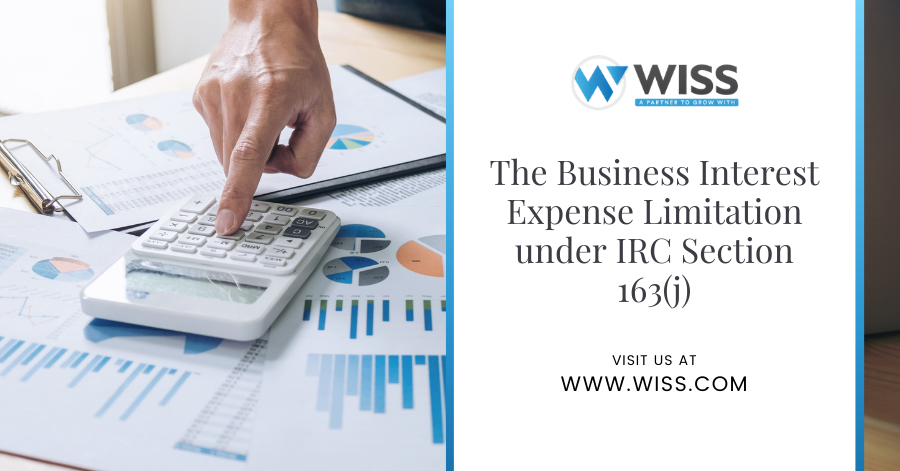By Jennifer Beceiro, Tax Manager & Eliezer Gross, Real Estate Tax Director
The Tax Cuts and Jobs Act (TCJA) amended IRC Section 163(j) that limited the deductibility of business interest expense for taxable years beginning after December 31, 2017. Business interest expense is limited to the sum of the Taxpayer’s business interest income, floor plan financing interest, and 30% of Adjusted Taxable Income (ATI).
There are two situations that Taxpayers may not be subject to the 163(j) limitation. This limitation does not apply to Taxpayers meeting the small business exemption, which is measured by gross receipts on an annual basis. The second situation applies to Taxpayers in certain trades or businesses. For example, Taxpayers in a real property trade or business have the option to make an election to avoid the 163(j) limitation. Depreciation on certain real property must follow the alternative depreciation system (ADS) instead of the modified accelerated cost recovery system (MACRS) if this election is made. The election is made once and is irrevocable. The CARES Act and two sets of final regulations issued by the IRS included significant changes that may impact 2020 tax return filings. Some of these changes are illustrated by the following examples.
Example #1: Taxpayer has Qualified Improvement Property (QIP) placed in service in 2018 and 2019. How can the Taxpayer claim additional depreciation?
QIP generally includes interior non-structural improvements to nonresidential real property after the real property was originally placed in service. Under the TCJA, QIP placed in service before 1/1/2018 was assigned a MACRS recovery period of 39 years and was not eligible for bonus depreciation. The CARES Act corrected this oversight by assigning a 15-year MACRS recovery period to QIP. This correction allows QIP to be eligible for bonus depreciation. This amendment is retroactive and can be applied to assets placed in service beginning 2018.
The Taxpayer has several options to claim bonus depreciation in this circumstance. The Taxpayer can amend its 2018 and 2019 tax returns. With respect to partnerships, partners can file an Administrative Adjustment Request (AAR). Alternatively, Taxpayers can file Form 3115 for change in method of accounting, which can be reflected on the 2020 tax return.
Example #2: Taxpayer anticipates its ATI to be significantly lower in 2020 and is concerned it will be subject to the 163(j) limitation. Is the limitation still 30% of ATI? Are there any other options?
The IRS provided relief to Taxpayers negatively affected by the current pandemic. The 163(j) limitation is modified to 50% of ATI for all Taxpayers in the 2020 tax year. Taxpayers can elect out of the 50% ATI limitation and instead use the 30% ATI limitation.
Furthermore, Taxpayers may elect to use their 2019 ATI instead of their 2020 ATI to calculate their 163(j) limitation. This may result in an increased amount of deductible business interest expense.
Example #3: Taxpayer is a partnership that qualifies for the small business exemption. The Taxpayer provided 163(j) information on the partners’ K-1s for 2018 and 2019, since they were subject to the 163(j) limitation. Is this still required?
The Proposed Regulations indicated that the 163(j) limitation could apply to partners, even if the partnership was exempt from the business interest limitation. Therefore, Taxpayers were required to provide the partners with their share of ATI, Business Interest Income, and Business Interest Expense for tax years 2018 and 2019.
The Final Regulations clarified that if a partnership qualifies for the small business exemption, the business interest expense is not subject to any further 163(j) limitation at the partner level. Therefore, there is no requirement to include 163(j) information on K-1s to the partners.
Example #4: Taxpayer is in the residential real estate business and owns a significant amount of residential real property. The Taxpayer did not make a real property trade or business election because of the decrease in depreciation. Did the ADS recovery periods change? If so, is there a way to make the real property trade or business election retroactively to 2018?
The newly released Consolidated Appropriations Act, 2021 expanded the TCJA to allow all residential rental properties to use a 30-year ADS recovery period, including those placed into service prior to 1/1/2018. This change provides increased depreciation to Taxpayers owning residential real property that already made the real property trade or business election. Furthermore, some Taxpayers would have made this election had the 30-year ADS recovery period, rather than the 40-year ADS recovery period prior to this amendment. The IRS is expected to provide further relief and guidance, such as allowing Taxpayers to make late elections or providing guidance on claiming the additional depreciation.
The above is only a small sample of the situations where we have advised our clients regarding these new regulations. There are additional complexities and opportunities relating to the application of the rules surrounding the 163(j) limitation. Please reach out if you need any assistance.

 Previous
Previous



